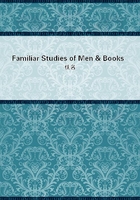
第93章
He has been tacking indeed, and he has indeed been seeking the favour of a queen; but what man ever sought a queen's favour with a more virtuous purpose, or with as little courtly policy? The question of consistency is delicate, and must be made plain. Knox never changed his opinion about female rule, but lived to regret that he had published that opinion. Doubtless he had many thoughts so far out of the range of public sympathy, that he could only keep them to himself, and, in his own words, bear patiently with the errors and imperfections that he could not amend. For example, I make no doubt myself that, in his own heart, he did hold the shocking dogma attributed to him by more than one calumniator; and that, had the time been ripe, had there been aught to gain by it, instead of all to lose, he would have been the first to assert that Scotland was elective instead of hereditary - "elective as in the days of paganism," as one Thevet says in holy horror. (1) And yet, because the time was not ripe, I find no hint of such an idea in his collected works. Now, the regiment of women was another matter that he should have kept to himself; right or wrong, his opinion did not fit the moment; right or wrong, as Aylmer puts it, "the BLAST was blown out of season." And this it was that he began to perceive after the accession of Elizabeth; not that he had been wrong, and that female rule was a good thing, for he had said from the first that "the felicity of some women in their empires" could not change the law of God and the nature of created things; not this, but that the regiment of women was one of those imperfections of society which must be borne with because yet they cannot be remedied. The thing had seemed so obvious to him, in his sense of unspeakable masculine superiority, and his fine contempt for what is only sanctioned by antiquity and common consent, he had imagined that, at the first hint, men would arise and shake off the debasing tyranny. He found himself wrong, and he showed that he could be moderate in his own fashion, and understood the spirit of true compromise. He came round to Calvin's position, in fact, but by a different way. And it derogates nothing from the merit of this wise attitude that it was the consequence of a change of interest.
We are all taught by interest; and if the interest be not merely selfish, there is no wiser preceptor under heaven, and perhaps no sterner.
(1) BAYLE'S HISTORICAL DICTIONARY, art. Knox, remark G.
Such is the history of John Knox's connection with the controversy about female rule. In itself, this is obviously an incomplete study; not fully to be understood, without a knowledge of his private relations with the other sex, and what he thought of their position in domestic life. This shall be dealt with in another paper.
II. - PRIVATE LIFE.
TO those who know Knox by hearsay only, I believe the matter of this paper will be somewhat astonishing. For the hard energy of the man in all public mattress has possessed the imagination of the world; he remains for posterity in certain traditional phrases, browbeating Queen Mary, or breaking beautiful carved work in abbeys and cathedrals, that had long smoked themselves out and were no more than sorry ruins, while he was still quietly teaching children in a country gentleman's family. It does not consist with the common acceptation of his character to fancy him much moved, except with anger. And yet the language of passion came to his pen as readily, whether it was a passion of denunciation against some of the abuses that vexed his righteous spirit, or of yearning for the society of an absent friend. He was vehement in affection, as in doctrine. I will not deny that there may have been, along with his vehemence, something shifty, and for the moment only; that, like many men, and many Scotchmen, he saw the world and his own heart, not so much under any very steady, equable light, as by extreme flashes of passion, true for the moment, but not true in the long run. There does seem to me to be something of this traceable in the Reformer's utterances: precipitation and repentance, hardy speech and action somewhat circumspect, a strong tendency to see himself in a heroic light and to place a ready belief in the disposition of the moment. Withal he had considerable confidence in himself, and in the uprightness of his own disciplined emotions, underlying much sincere aspiration after spiritual humility. And it is this confidence that makes his intercourse with women so interesting to a modern. It would be easy, of course, to make fun of the whole affair, to picture him strutting vaingloriously among these inferior creatures, or compare a religious friendship in the sixteenth century with what was called, I think, a literary friendship in the eighteenth.
But it is more just and profitable to recognise what there is sterling and human underneath all his theoretical affectations of superiority. Women, he has said in his "First Blast," are, "weak, frail, impatient, feeble, and foolish;" and yet it does not appear that he was himself any less dependent than other men upon the sympathy and affection of these weak, frail, impatient, feeble, and foolish creatures; it seems even as if he had been rather more dependent than most.